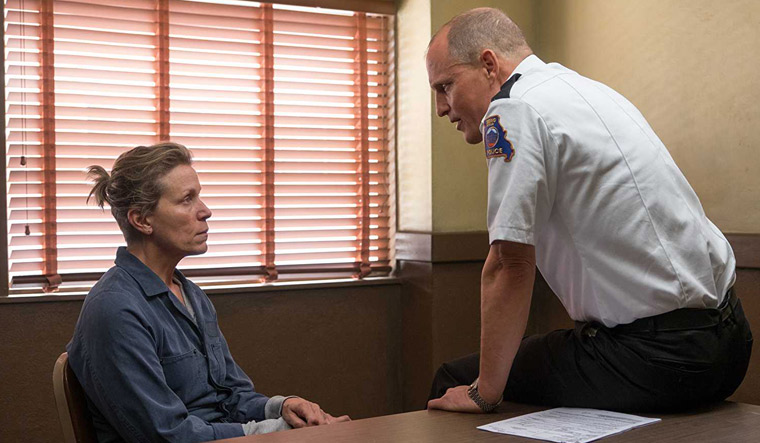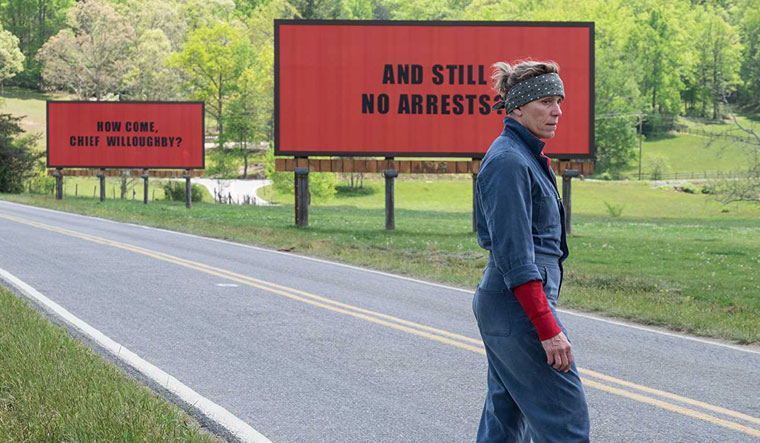An uncomfortable statement and two painful questions—‘Raped While Dying’, ‘And Still No Arrests?’, ‘How Come, Chief Willoughby?—written on Three Billboards Outside Ebbing, Missouri, is an innovative form of agitation. Clear, loud and painted in large letters, the statements are powerful enough to unsettle anyone who passes by the road. They are also commanding enough to disconcert a cine-goer unlike a dialogue, or the very act of that particular crime itself.
Directed by Martin McDonagh (In Bruges, Seven Psychopaths), Three Billboards Outside Ebbing, Missouri is a compelling story of rebellion, vengeance and forgiveness. It is also an attempt to explore the complexities of grief, loss and redemption, while retaining a bleak sense of humour that is characteristic of McDonagh flicks.
Mildred Hayes (Frances McDormand) decides to take matters into her hands when she realises that little progress has been made by the police in the probe into the rape and murder of her daughter, seven months ago. Her unorthodox method to arrest the attention of the police department—by renting three billboards—doesn't go down well with the people in her sleepy town. The investigating officer, Sheriff Bill Willoughby (Woody Harrelson), and his cantankerous deputy, Jason Dixon (Sam Rockwell), and almost everyone in town, want her to do away with the billboards.
Willoughby and Dixon have their own personal demons to battle and Mildred's decision have made their lives a lot harder. But Mildred is a unswerving woman; she won't bow down to any demand until justice is served. Three Billboards focuses on how the one-woman army of Mildred stands up against the town despite realising that her chances of getting justice are scarce, while throwing up a slew of surprises—some fairly pleasant, others disturbing.
“You are, for the want of a better word, a gang…and if you are upstairs, smoking a pipe and reading a bible when while one of your gang members is downstairs, fucking an alter boy, then…you are culpable, cos you joined the gang, man. I don’t care if you never did shit, never saw shit or never heard shit. You joined the gang, man. You are culpable,” Mildred’s angry rant to a priest who comes to her house to request her to have the billboards removed is her outlash, not just against the church, but against a society that is less sympathetic to her plight for justice. She is up against the criminal justice system, the people who see her act of defiance as a disgrace to the whole town, and especially to the well-respected Willoughby.
But, behind that tough, staid countenance of Mildred is an affectionate person, and you get to see it only a few moments in the film. That’s telling a lot about the person that Mildred was, and how the tragedies in her life shaped her to be the woman that you see on screen. McDormand embodies Mildred, inhabits her world and thoughts in ways only a few actors can, to offer one of the strongest female characters portrayed on screen in recent times. A bandana almost always in place and mostly seen in a mechanic's uniform, Mildred is foul-mouthed, unpredictable and may at times come across as a heartless, insensitive bully. A well-shaped character with enough unrefined edges, Mildred is indeed an instance of fine characterisation.

Rockwell's Dixon, a racist cop who tends to fly off the handle too often for his own good, is another remarkable character study Three Billboards presents. Dixon, as Willoughby acknowledges, is a good cop with a gut instinct, as evidenced by a rather comic scene in the later part of the film. But the man is violent, careless, and brazenly insensitive. McDonagh, however, doesn't leave Dixon where he is when you see him first, but offers him a redemption that you will hardly see coming.
Rockwell has already won a few awards for Dixon, and come Academy Awards, he is likely to grab the best support cast award.
At the receiving end of Mildred's rage is Harrelson's Willoughby. A loving father and a sensitive cop, Willoughby is almost the sensible voice in the film, until his unpredictable decision that will leave you stunned. Harrelson, as always, brings out the many shades and sides of a man who has only a few days left to live and who is constantly troubled by the Three Billboards Outside Ebbing, Missouri, addressed to him.
The rest of the supporting cast, including Peter Dinklage, Lucas Hedges, Clarke Peters (ah, the irony of casting Clarke 'Lester' Peters as a cop who upholds the law), are impressive as well.
McDormand keeps his characters as earthy as they could be. They curse, seldom care for political correctness; they are loud and uninhibited. They also have uncanny, bleak sense of humour, and at times, when most uncalled for. They are unpredictable, not quite unlike the plot which comes with surprises aplenty.
Even people in Mildred’s town are not exactly vicious. In fact, they sympathise with Willoughby. They may have been considerate and comforting when Mildred lost her daughter. But public memory is woefully short, especially when it comes to tragedies that happened to someone else. Their resentment to Mildred’s unconventional method to get justice springs from the fact they do want to forget an unpleasant episode and move on with their lives. The billboards are a stark reminder of an unpleasant incident and a telling testament of shallow public sentiments.
Three Billboards has won several awards and is poised to win more at the Academy Awards.
Movie: Three Billboards Outside Ebbing, Missouri
Director: Martin McDonagh
Starring: Frances McDormand, Sam Rockwell, Woody Harrelson, Peter Dinklage
Rating: 4/5


